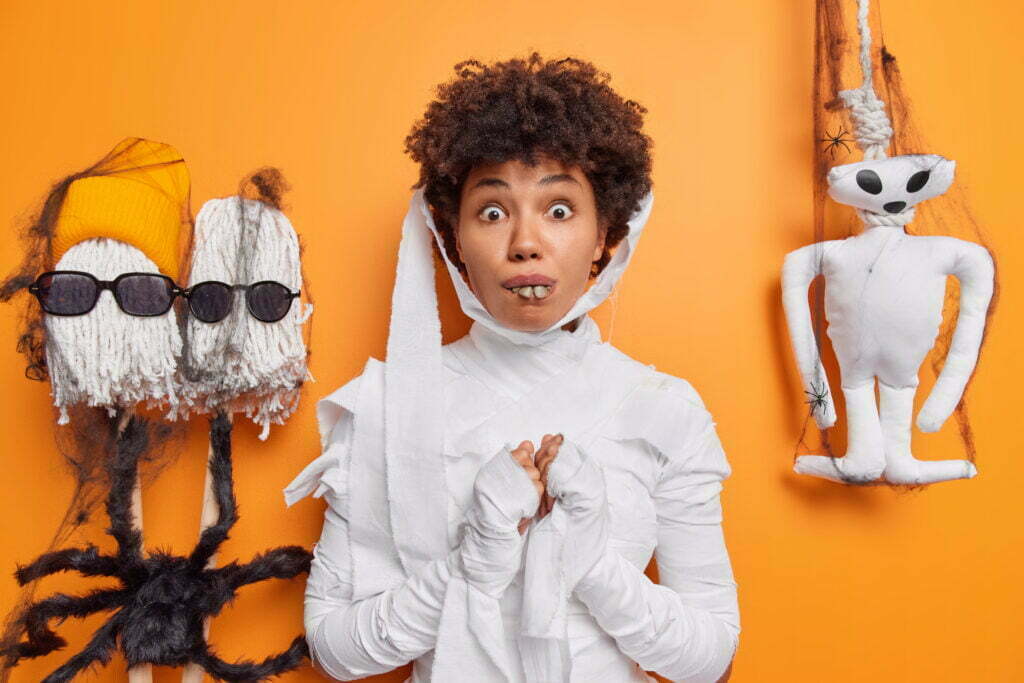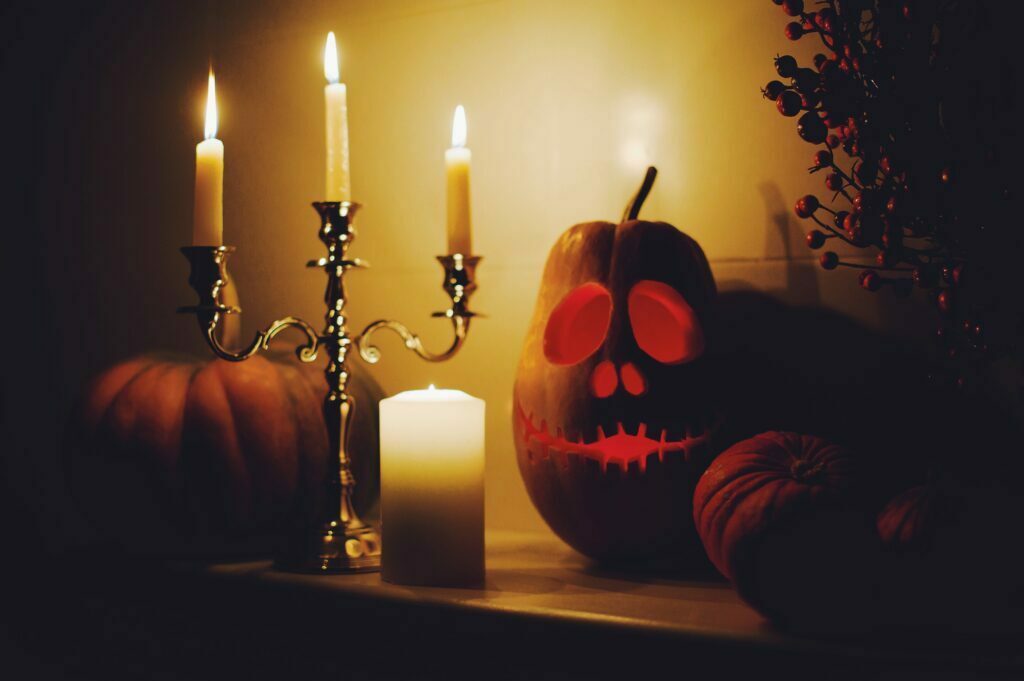So, Halloween is just around the corner and you’re feeling a little on edge. Maybe the spooky decorations and horror movies are starting to get to you, and you find yourself feeling more anxious than excited about the holiday. Well, if you’re afraid of Halloween, there’s no need to fret. In this article, we’ll explore some practical tips and strategies to help you navigate through the fears and enjoy the festivities without any unnecessary fright.
Understanding Halloween
Halloween is a widely celebrated holiday that takes place on October 31st each year. It is often associated with costumes, trick-or-treating, and spooky decorations. However, for some individuals, Halloween can be a source of fear and anxiety. It’s important to understand the origins and symbolism of Halloween, as well as the common activities associated with it.
The Origins of Halloween
The roots of Halloween can be traced back to ancient Celtic traditions. The Celts celebrated Samhain, a festival marking the end of the harvest season and the beginning of winter. They believed that on the night of October 31st, the boundary between the living and the dead was blurred, allowing spirits to roam freely. To ward off these spirits, people would light bonfires and wear disguises.
The Symbolism of Halloween
Halloween is known for its symbolic elements. The most prominent symbol is the jack-o’-lantern, which originated from the legend of “Stingy Jack.” Another common symbol is the black cat, which has long been associated with witches and superstitions. These symbols, although often seen as spooky or scary, have become integral to the Halloween tradition.
Common Halloween Activities
Trick-or-treating, where children go door-to-door asking for candy, is arguably the most popular Halloween activity. Haunted houses, costume parties, and pumpkin carving are also common activities. However, for individuals who are afraid of Halloween, these activities can be overwhelming and anxiety-inducing. It’s important to recognize and address these fears in order to enjoy the holiday season.
Examining Your Fear
If you find yourself experiencing fear or anxiety surrounding Halloween, it’s essential to take the time to examine and understand the root cause of your fear.
Identifying the Root Cause of Your Fear
Fear of Halloween can stem from various sources. It might be associated with childhood experiences, such as a particularly frightening Halloween event or a specific costume that left a lasting impression. It could also be linked to cultural or religious beliefs, where Halloween may conflict with personal values or traditions. By identifying the root cause of your fear, you can begin to address and overcome it.
Understanding the Impact of Your Fear on Your Life
It’s important to recognize how your fear of Halloween affects your daily life. Are you avoiding certain places or activities during the Halloween season? Do you feel anxious or on edge at the thought of Halloween approaching? Understanding the impact of your fear is crucial in order to make positive changes and regain control over your emotions.
Seeking Support
Dealing with fear or anxiety can be challenging, but you don’t have to face it alone. Seeking support from trusted friends, family members, or mental health professionals can be a valuable step towards overcoming your fear of Halloween.
Talk to a Trusted Friend or Family Member
Opening up to a friend or family member about your fear of Halloween can provide a sense of relief and support. They can offer understanding and potentially share their own experiences or advice. Sometimes, simply discussing your fear with someone who cares about you can bring new insights and perspectives.
Consult a Mental Health Professional
If your fear of Halloween significantly impacts your daily life or causes severe distress, it may be beneficial to seek guidance from a mental health professional. They can help you navigate and address your fear through therapy, counseling, or other appropriate interventions. A trained professional can provide you with coping mechanisms and techniques tailored to your specific needs.
Gradual Exposure
When facing a fear, it can be helpful to gradually expose yourself to the object of your fear. This gradual exposure approach can be equally effective in coping with fear of Halloween.
Educating Yourself About Halloween
By learning more about the origins, traditions, and symbols of Halloween, you can gain a better understanding of the holiday. This knowledge can help demystify Halloween and reduce some of the fear associated with it. Learning about Halloween from a historical, cultural, or even a psychological standpoint can provide you with a fresh perspective.
Start with Non-Threatening Halloween Experiences
Instead of jumping into Halloween activities that trigger your fear, start with non-threatening experiences. For instance, you could attend a fall festival or visit a pumpkin patch. These activities allow you to ease into the Halloween season gradually, without the overwhelming aspects that may trigger your fear.
Participating in Small Group Activities
Consider participating in small group activities with friends, family, or supportive individuals who are aware of your fear. This can help create a safe and comfortable environment for you to engage in Halloween activities at your own pace. Surrounding yourself with understanding and empathetic individuals can provide a sense of security and alleviate anxiety.
Managing Anxiety
Anxiety often accompanies fear, and it’s important to have coping strategies in place to manage anxiety when facing your fear of Halloween.
Utilize Relaxation Techniques
When anxiety creeps in, relaxation techniques can be incredibly helpful. Deep breathing exercises, progressive muscle relaxation, and guided imagery are just a few techniques that can calm your mind and body. Practicing these techniques regularly, especially during the Halloween season, can help you manage anxiety and maintain a sense of calm.
Practice Mindfulness
Mindfulness involves staying present in the moment and accepting your thoughts and feelings without judgment. By practicing mindfulness, you can focus on the present rather than anticipating future fearful events. Incorporating mindfulness techniques, such as meditation or grounding exercises, into your daily routine can assist in reducing anxiety around Halloween.
Seek Professional Help if Necessary
If anxiety continues to be overwhelming or interferes with your daily life, it may be beneficial to reach out to a mental health professional. They can help you develop personalized strategies to manage anxiety specific to your fear of Halloween. Therapy or counseling can provide you with ongoing support and guidance throughout the Halloween season and beyond.
Creating a Safe Environment
To alleviate some of the fear and anxiety associated with Halloween, consider creating a safe environment for yourself.
Decorating Your Space with Non-Scary Elements
If decorations and imagery associated with Halloween are a trigger for your fear, opt for non-scary elements. Focus on fall-themed decor or decorative items that bring you comfort and joy. This can help create an atmosphere that feels welcoming and safe to you.
Planning Alternatives to Traditional Halloween Activities
Instead of engaging in traditional Halloween activities that evoke fear, consider planning alternative activities that align with your interests and preferences. Host a movie night with non-Halloween-themed films, organize a game night, or participate in crafts or hobbies that bring you joy. By focusing on activities that bring you comfort, you can celebrate the season in a way that feels authentic to you.
Building Resilience
Building resilience is key to overcoming fear and anxiety associated with Halloween. By gradually confronting your fear, challenging negative thoughts, and celebrating personal achievements, you can develop resilience to face future challenges.
Gradually Confront Your Fear
With the support of friends, family, or mental health professionals, gradually confront your fear of Halloween. Start by exposing yourself to small doses of Halloween-related stimuli, such as images or decorations. As you become more comfortable, gradually increase your exposure until you feel more at ease with Halloween-related activities.
Challenge Negative Thoughts
Negative thoughts and beliefs often contribute to fear and anxiety. Challenge these thoughts by questioning their validity and replacing them with more positive and rational perspectives. Remind yourself that Halloween is just a holiday and that your fear does not define you. Over time, this shift in mindset can help diminish your fear.
Celebrate Personal Achievements
Acknowledge and celebrate your personal achievements in overcoming your fear of Halloween, no matter how small. Give yourself credit for each step you take towards facing your fear. By recognizing your progress and celebrating your accomplishments, you can boost your confidence and motivation to continue challenging yourself.
Connecting with Others
Social support plays a crucial role in overcoming fear and anxiety. Connect with others who can provide empathy, understanding, and encouragement during the Halloween season.
Join Support Groups or Online Communities
Consider joining support groups or online communities that focus on individuals overcoming their fear of Halloween. These communities provide a safe space for sharing experiences, seeking advice, and building connections with others who can relate to your fears. Sharing your journey with like-minded individuals can provide a sense of validation and support.
Participate in Halloween Events
As you build resilience and become more comfortable, consider participating in Halloween events. Start with smaller-scale events or community gatherings where you feel more control and support. By engaging in these events, you can gradually expose yourself to Halloween activities while surrounded by supportive individuals who understand your fear.
Volunteer for Halloween-Related Causes
An alternative way to engage in Halloween activities is by volunteering for Halloween-related causes or events. This allows you to play an active role in the holiday while focusing on giving back to the community. By channeling your energy into helping others, you can shift the focus away from your fear and find a sense of fulfillment.
Exploring Alternative Celebrations
If Halloween continues to evoke fear and anxiety, consider exploring alternative celebrations during the fall season.
Focus on Celebrating Fall or Harvest Festivals
Shift the focus of your celebrations towards fall or harvest festivals instead of Halloween. These festivals often embrace the beauty of the season without the spooky or scary elements. Engage in activities such as apple picking, hayrides, or attending local community fall festivals. By redirecting your attention to the vibrancy and joy of the season, you can create new traditions that align with your preferences.
Engage in Activities that Bring Joy and Comfort
Focus on activities that bring you joy and comfort during the Halloween season. This may include enjoying seasonal treats, watching favorite movies, or engaging in hobbies that bring you a sense of peace and relaxation. By celebrating the aspects of the season that resonate with you, you can create a fulfilling and enjoyable experience, free from fear.
Self-Care and Self-Compassion
Throughout your journey of overcoming your fear of Halloween, prioritize self-care and self-compassion.
Take Care of Your Physical and Emotional Well-being
Ensure that you are taking care of your physical and emotional well-being during the Halloween season. Engage in regular exercise, maintain a balanced diet, and get enough restful sleep. Additionally, practice self-care activities such as journaling, meditation, or spending time in nature. Taking care of yourself holistically can help alleviate anxiety and promote emotional well-being.
Practice Self-Compassion and Acceptance
Be kind and patient with yourself as you face your fear of Halloween. Understand that overcoming fear takes time and effort. Practice self-compassion by acknowledging your feelings and experiences without judgment. Accept that fear is a natural emotion and that it does not define your worth. By treating yourself with kindness and acceptance, you can foster resilience and find the strength to navigate the Halloween season with greater ease.
In conclusion, if you are afraid of Halloween, it’s essential to understand the origins and symbolism of the holiday, examine the root cause of your fear, seek support from trusted individuals or mental health professionals, gradually expose yourself to Halloween-related experiences, manage anxiety through relaxation techniques and mindfulness, create a safe environment by decorating with non-scary elements and planning alternative activities, build resilience by confronting your fear, challenging negative thoughts, and celebrating personal achievements, connect with others through support groups or volunteering, explore alternative celebrations focusing on fall or harvest festivals, prioritize self-care and self-compassion, and practice acceptance. By following these steps, you can navigate Halloween with greater ease and find ways to enjoy the season that align with your preferences and comfort level. Remember, overcoming fear takes time and effort, but with the right support and mindset, you can reclaim Halloween and celebrate the season on your terms.



